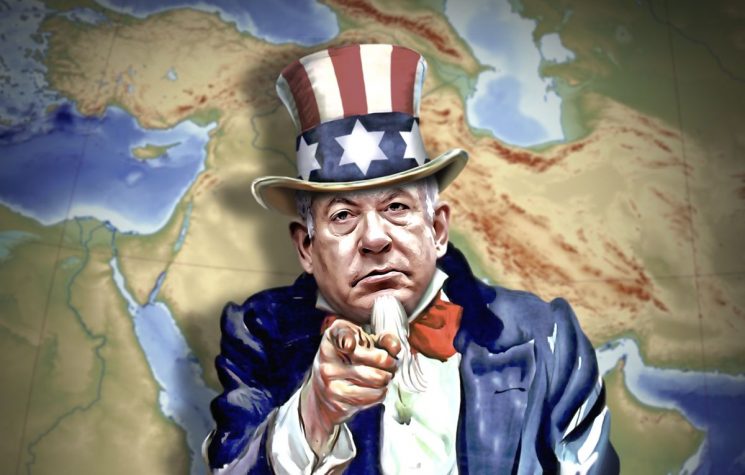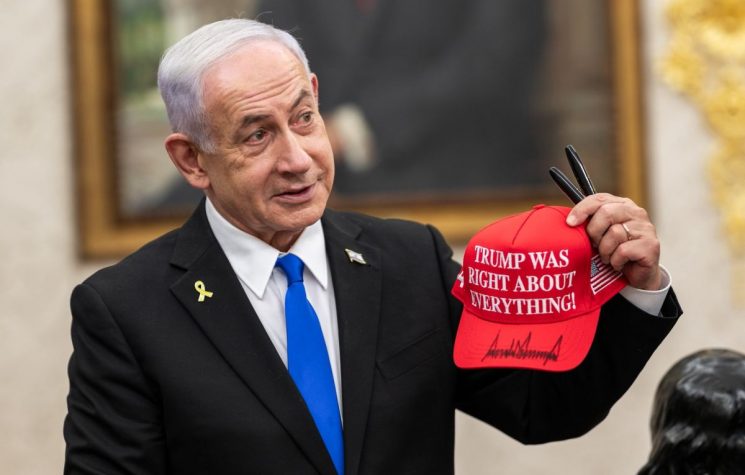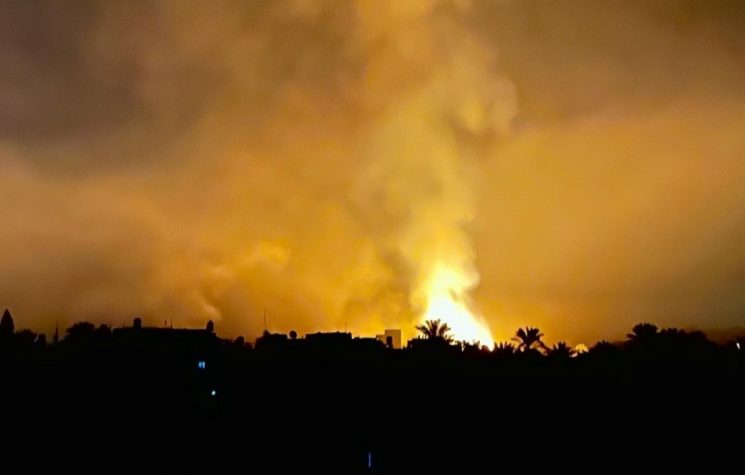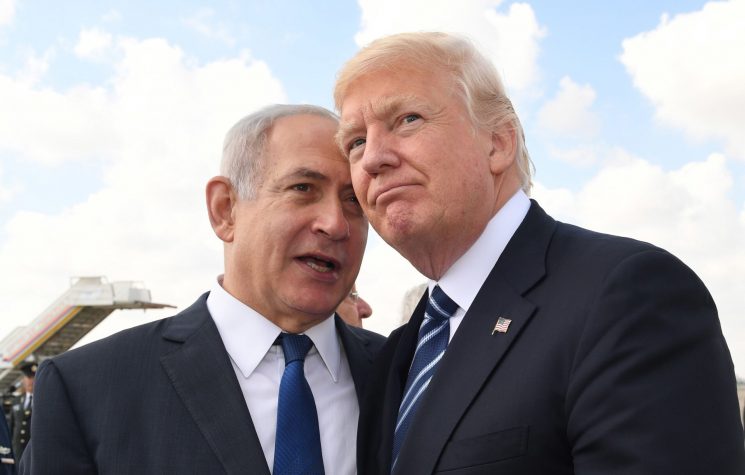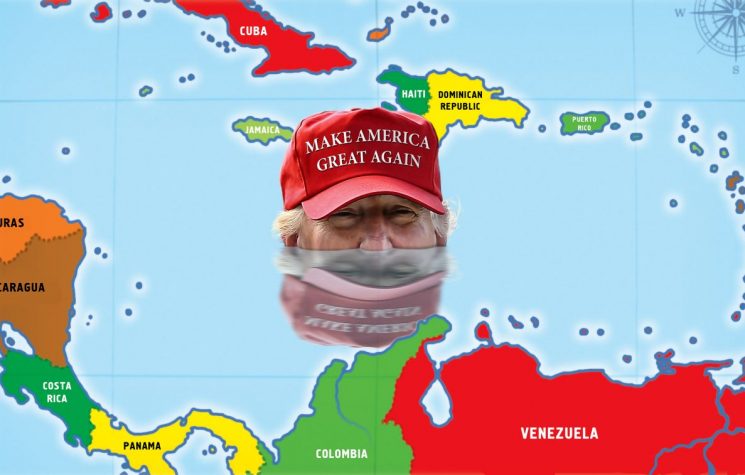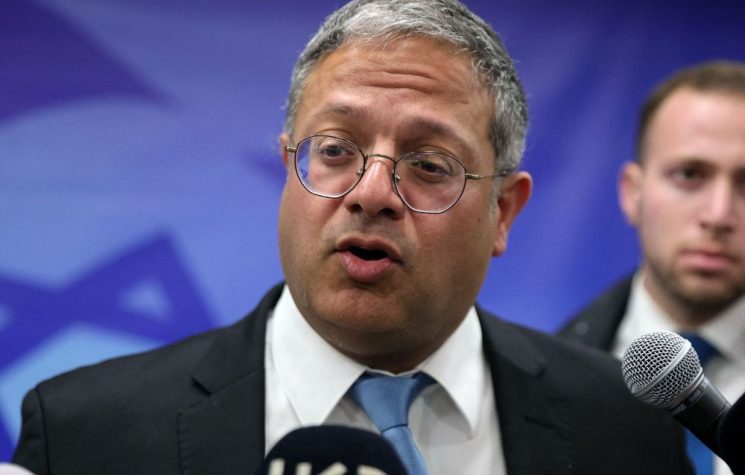We were just waiting for Donald Trump’s words on Palestine, and we had no doubt they would be bad.
Contact us: info@strategic-culture.su
We were just waiting for Donald Trump’s words on Palestine, and we had no doubt they would be bad.
The press conference
Donald Trump inaugurated the visits of heads of state to Washington, and the first to receive the honor of the invitation was his close friend Bibi Netanyahu. Who else could it be?
Netanyahu and Trump are longtime friends: during his first presidency, Trump did a great deal of favors for Israel, such as recognizing the city of Jerusalem as its capital, where he also moved the U.S. Embassy, promotion of the Abrahamic Accords, continued and overt support for the Greater Israel project, and quite a bit of military investment.
So it was that at a press conference after their closed-door meeting, the two politicians made a series of statements expected by the whole world. We quote some of them for eternal memory:
Lies about ISIS
“Together we defeated ISIS [ISIL], ended the disastrous nuclear deal with Iran, one of the worst deals ever, and imposed the toughest sanctions ever on the Iranian regime. We starved Hamas and Iran’s other terrorist proxies, and we starved them like never before: resources and support for them disappeared.”
Greater Israel
“I recognized Israel’s capital, I opened the U.S. Embassy in Jerusalem and got it built. We had it built. It’s beautiful, all in Jerusalem stone, right near there, and it’s something very special.”
“I recognized Israeli sovereignty over the Golan Heights, which had been talked about for 70 years without getting it. And I got it. And with the historic Abrahamic Accords, an achievement that I think will become increasingly important because we have achieved the most significant peace agreements in the Middle East in half a century.”
Israelis as victims
“In the last 16 months, Israel has been under aggressive and murderous attack on all fronts, but it has responded courageously. You see it and you know it. We have seen an all-out attack on the very existence of a Jewish state in the Jewish homeland. Israelis stood strong and united in the face of an enemy that kidnapped, tortured, raped and slaughtered innocent men, women, children and even babies.
“I want to pay tribute to the Israeli people for facing this ordeal with courage and determination and unwavering resolve. It has been strong. In our meetings today, the prime minister and I focused on the future, discussing how we can work together to ensure the elimination of Hamas and, ultimately, to bring peace to a very troubled region. It has been troubled, but what has happened in the last four years has not been good.”
What will become of Gaza
“I also firmly believe that the Gaza Strip, which has been a symbol of death and destruction for so many decades and so negative for the people near it, and especially for those who live there and who frankly have been very unfortunate indeed. It has been very unfortunate. It has been an unfortunate place for a very long time.”
“Its presence has not been good and it should not be subjected to a process of reconstruction and occupation by the same people who stayed there and fought for it and lived there and died there and lived a miserable existence there. Instead, we should turn to other interested countries with humanitarian hearts, and there are many who want to do that, and build various domains that will eventually be occupied by the 1.8 million Palestinians living in Gaza, ending the death and destruction and frankly the misfortune.”
“The United States will take control of the Gaza Strip and we will also do a job with it. We will own it and be responsible for dismantling all the dangerous unexploded bombs and other weapons there, level the site and get rid of the destroyed buildings, level it. Create economic development that will provide unlimited jobs and housing for local residents… do real work, do something different.
“There is no turning back. If you go back, it will end the same way it has been for 100 years. I hope this cease-fire can be the beginning of a broader and lasting peace that will end the bloodshed and killing once and for all. With the same goal in mind, my administration has moved quickly to restore confidence in the alliance and rebuild American strength throughout the region, and we have indeed succeeded.
The underlying problem does not change. The Zionist ideology in American sauce has been the same for more than a century and it doesn’t hint at changing. Right or left, Rep or Dem, the positions do not change because the master is always the same. Then again, the image of Trump cozying up to Netanyahu upon his arrival will remain iconic. A perfect janitor.
Nor do the fixed points of American hatred for anything that does not respect hegemonic imperialism change: Iran has been repeatedly cited as an enemy, with offensive and unjustified words. The very Iran that is part of the foreign policy agenda that Trump has tenaciously promoted since the beginning of the campaign.
With a game of pure demagoguery, Trump has managed to insult the memory and martyrdom of thousands of Palestinians, going so far as to blame the Axis of Resistance and the Palestinians themselves.
A project that cannot be stopped
On a well-known Jewish website, an article appeared on Feb. 6 commenting on Bibi and Donald’s meeting in a truly enthusiastic manner, providing an important key insight regarding American Zionism and messianism. The text hails Trump as an “accelerator of the coming of the Messiah” long awaited by Israel.
During his first term, President Trump was a strong supporter of Israel, recognizing Jerusalem as its capital and moving the embassy, recognizing sovereignty over the Golan, and establishing the Pompey Doctrine that Jewish settlements in Judea and Samaria do not violate international law.
Less than a month after his possible return, the effects of the “Trump wave” are already being felt in the region. After nearly two years of pressure from Biden on Israel, Israeli hostages were still being held in Gaza. The threat of a pro-Israel administration led to a truce that allowed the release of some hostages.
But it is clear that the best is yet to come. Just a few weeks ago, Saudi Arabia declared that it would not accept a normalization agreement with Israel without the creation of a Palestinian state. On Wednesday, Trump announced that the Saudis had changed their minds and were considering a deal with Israel and that the hostage deal would soon be finalized.
Perhaps the most significant revelation concerns Trump’s proposed Gaza solution, which goes straight to the heart of the matter. Much of the Gaza debate has focused on the post-conflict future. It is clear that Hamas will no longer be able to rule, but the Palestinian Authority, which has allied itself with Hamas, is unstable and foments violence, according to Potus. Other regional actors hostile to Israel reject a return to the 2005 situation, when Israel controlled Gaza’s security.
While Palestinians continue to present Gaza as an “open-air prison,” Trump argues, in reality it is a coastal area with great potential. Before the forced removal of Jewish communities in Gush Katif in 2005, the area had a thriving agricultural industry, with daily exports exceeding $80,000.
To understand Gaza’s future in relation to Israel, it is essential to consider its biblical and prophetic role, because this is inescapable to the American neocon-Zionist mindset: Gaza appears 18 times in the Hebrew Bible and is mentioned in Genesis 10:19 as part of the southern border of the Promised Land, but, throughout history, it has been occupied by Assyrians, Philistines and Egyptians. It was one of five Philistine cities in the coastal plain of Israel and one of those that Joshua failed to conquer, as we read in Joshua 10:41.
Rabbi Yekutiel Fish, a well-known Jerusalem mystical scholar and author of a Torah blog titled Sod HaChashmal, praised Trump’s plan and predicted its success. “Trump is a man who makes deals that are impossible for anyone else,” Rabbi Fish said. “For him, this is a win-win deal.” However, he sees Trump’s Gaza strategy as part of a bigger picture: “Everyone focuses on Gaza, but it is only one piece of prophecy, which envisions the return of Jews within Israel’s biblical borders,” Fish said. “The Torah explicitly mentions Gaza. Trump is cleansing Gaza of Israel’s enemies. After the Messiah, only those who believe in the One God will be able to dwell within the biblical borders of Israel. This includes Gaza, half of Lebanon and most of Jordan.”
The picture now seems complete. Syria has collapsed. Lebanon is in ruins. Gaza is destroyed. The world is ready for the Messiah of the Jews, but how can the Palestinians remain when the Messiah comes? They have to be taken out of the way. Someone has to take care of them, and that someone is Donald Trump. In Zionist logic, Trump is simply completing the final preparations for the revelation of the Messiah.
The direction is clear: the Greater Israel project cannot be stopped; the rebuilding of the Temple is and will remain at the center of the policy of Donald Trump’s administration.
A comparison to the East
When examining the relationship between the United States and Israel, the hierarchy of power is evident. The U.S. operates as a subordinate entity to Israel, with the alliance being one-sided and lacking any real balance.
During the ongoing conflict in Ukraine, Israel independently decided to launch a military operation in Gaza, which subsequently expanded to Lebanon and Syria. This move significantly undermined the United States’ ability to control its global narrative, as it found itself compelled to defend Israel’s military actions—widely seen as ethnic cleansing—while simultaneously condemning Russia’s actions in Ukraine.
Likewise, America’s standing in the Muslim world has eroded, a trend that has been intensifying over the past decade. This is particularly relevant in the context of oil production and OPEC, where U.S. influence has diminished.
Trump’s recent pro-Israel rhetoric regarding Gaza has further alienated Muslim nations, exacerbating tensions between the West and the Islamic world. Even historically close U.S. partners in oil production, such as Saudi Arabia, have adopted a more neutral stance.
Given that a key element of Trump’s strategy to pressure Russia into negotiations revolves around lowering global oil prices with OPEC’s support, a clear divergence of interests between Israel and the U.S. emerges. Yet, Trump has chosen to prioritize Netanyahu’s objectives over both American national interests and his own geopolitical plans.
In contrast, Israel’s relationship with Russia appears to be more balanced, if not tilted in Moscow’s favor. Despite Russia providing Iran with Su-35 fighter jets and other military equipment, as well as playing a crucial role in sustaining the Assad regime in Syria, Israel has contributed very little to Ukraine—the primary U.S. military focus in Europe—offering only limited assistance, such as radar technology against drones.
Jewish communities in the United States, apart from certain ultra-Orthodox factions, tend to lean liberal and are not necessarily staunchly pro-Israel. In fact, evangelical Christians in the U.S. often exhibit stronger Zionist sentiments than many American Jews. Furthermore, when American Jews immigrate to Israel, they generally do not maintain deep ties with the U.S. Nonetheless, within American society and government, Jewish groups hold a uniquely influential position.
In Russia, the dynamic is notably different. Jewish groups there function similarly to other ethnic communities that navigate the political system to advance their own interests—such as Azerbaijani, Armenian, and Georgian groups. It is not uncommon to hear about Jewish influence in Russian affairs, but the same can be said for these other ethnic communities as well.
As for Russian and Ukrainian Jews in Israel, they often lean toward conservative viewpoints. Interestingly, they maintain stronger connections with Europe, as seen in the annual pilgrimage to Uman and the presence of Russian-speaking political parties in Israel, such as Yisrael Beiteinu. However, as these parties shift toward more progressive policies, they are losing support from their original Russian-speaking voter base.
Ultimately, these distinctions are worth noting, as Russia appears to be the only European or Anglo-Saxon nation that Israel does not treat in a purely subordinate manner.












